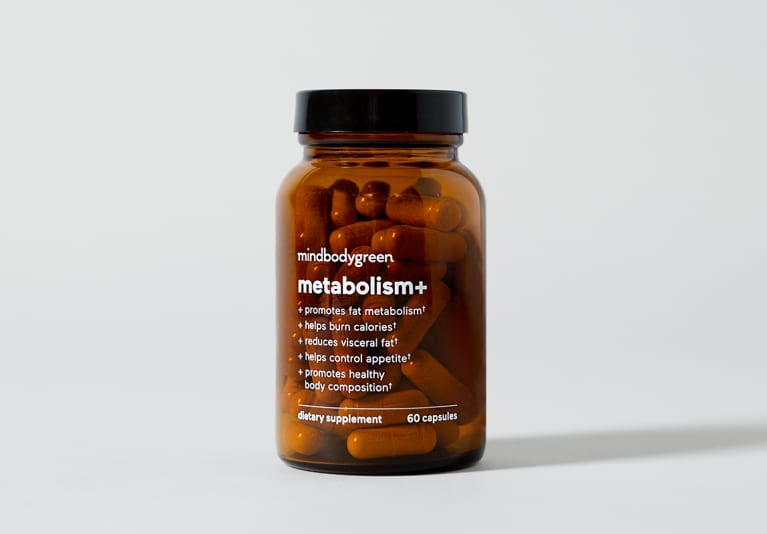
Our editors have independently chosen the products listed on this page. If you purchase something mentioned in this article, we may earn a small commission.
September 22, 2022 — 9:01 AM
We’ve all been there: You eat a heavy meal or something sweet in the middle of the day, you feel euphoric for a bit, and then you crash—hard. Lauren Kelley-Chew, M.D., physician and head of clinical product at Levels, calls it the “metabolic hangover,” and although it’s quite common, it doesn’t have to be an everyday occurrence.
“If you have metabolic health, there’s no reason why you have to have interrupted sleep as a normal part of your day. Why being hangry, having mood swings, or having specific food cravings or crashes has to be a thing,” she declares on this episode of the mindbodygreen podcast. How do you avoid those dreaded hangovers? So glad you asked—below, Kelley-Chew offers her expert tips:
According to Kelley-Chew, food preparation really makes a difference in terms of the glucose response. Read: The same exact food cooked two different ways can have totally different effects on your blood sugar. Take potatoes, for example: “When you take some starches, like potatoes, and you cook and then cool them, the cooling process actually increases the amount of resistant starch in that potato,” Kelley-Chew says. And resistant starches are great for blood sugar balance; research even shows they may improve insulin sensitivity.
metabolism+
Multi-pronged approach to promote healthy weight & body composition*

Her team at Levels even conducted a small yet informative experiment, where members ate one serving of starch cooked hot and fresh and another serving after it had cooled down in the refrigerator. “In both cases, they were asked to eat the starch without any additives other than salt and pepper,” she notes. “On average, the glucose spike for the cooled, refrigerated portion was 11 points lower than the hot and fresh portion.” Neat, no? “Something as simple as cooling your food down before you eat it can make a difference,” she adds.
2. Pair foods strategically.
Kelley-Chew doesn’t say you should give up carbs—rather, pair your carbs with a source of fat, fiber, and protein to mitigate the blood sugar spike. (Biochemist Jessie Inchauspe calls it “putting clothing on your carbs.”)
“When you eat carbs alone, your body absorbs those very quickly. They turn into sugar very quickly, and you’ll get a big spike,” Kelley-Chew explains. “If instead you pair that [carb] with fat and protein—for example, olive oil, avocado, or whatever else is available—that will slow down the spike dramatically.” It’s a helpful hack for those who want to balance their blood sugar but don’t necessarily want to change what they eat. “You don’t even have to deprive yourself of what you’re going to eat. You just postpone it by a few minutes or you add something to it,” notes Kelley-Chew.
“Walking or moving a little bit after you eat is incredibly powerful,” says Kelley-Chew. In fact, one randomized controlled trial found that those who moved their body within an hour of eating, even at low intensity and for only 10 minutes, helped manage their blood glucose levels. “Your muscles are essentially glucose sinks,” Kelley-Chew explains. “When you use your muscles, it just sucks glucose right out of the blood and automatically lowers the impact of that spike.”
You don’t want to do anything too strenuous (intense exercise can actually raise blood sugar, so your body has enough energy to get through the physical activity); just some very low-intensity movement will do the trick—perhaps a post-dinner stroll.
4. Eat carbs earlier in the day.
When it comes to blood sugar balance, when you eat might be just as important as what you consume. “Glucose tolerance and insulin sensitivity cycle throughout the day,” says Kelley-Chew. “So the same food that you eat in the morning versus the night will very well have a different glucose response.” Specifically, she notes we have our best blood sugar control in the midmorning, around 10 a.m. “Then it just goes downhill from there.” So if you’re going to eat blood-sugar-spiking foods, it may be best to do so earlier in the day.
At the very least, you’ll want to avoid those glucose spikes late at night, when your body starts to naturally create melatonin. “Melatonin actually suppresses insulin, so if you eat high-glucose foods at night, you’re actually doing that in a situation where you don’t have as much insulin available to even deal with that blood sugar,” Kelley-Chew explains. That’s why many experts recommend you stop eating a few hours before you go to bed, if you can swing it.
You do not have to spend every day with a metabolic hangover. According to Kelley-Chew, just a few tweaks to your lifestyle can make a huge difference, even if you don’t change your actual diet itself. Although, if you are curious about the best blood-sugar-balancing foods to add to your grocery cart, we do have a list of staples for you to snag.

metabolism+
Multi-pronged approach to promote healthy weight & body composition*
metabolism+
Multi-pronged approach to promote healthy weight & body composition*

https://www.mindbodygreen.com/articles/4-tips-to-avoid-metabolic-hangover-from-md

